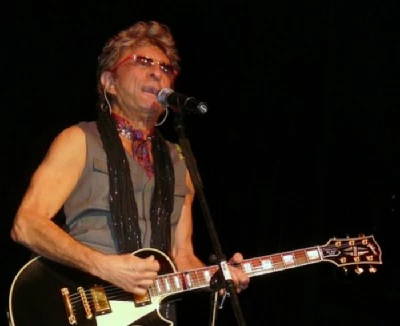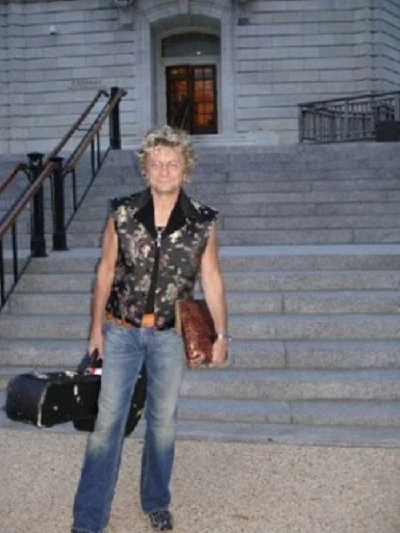published: 6 /
10 /
2009

...while in the second part he talks to her about some of his other projects and why he has always maintained his Chicago working class roots
Article
PB: After listening to Lifeforce I was captivated by ‘Ghost Orchid.’ (Jim Peterik’s Lifeforce, ’09) “Rare and strong, untouched by man…” How much research went into this song?
JP: Thanks for appreciating it. It’s one of my faves. Initially, it starts with inspiration. I mean you can’t hear the words, ‘Ghost Orchid’ together and not get a feeling. It starts with that – those two words together were just incredible.
In this particular case I think I had Lisa (McClowry –vocalist) do the research and she printed out the pages on the Ghost Orchid. I was reading it – it became that description of Lisa. “Untouched by man” that doesn’t work, but in a way, the ‘Ghost Orchid’ is Lisa because she’s really fragile and she’s strong, so that’s kind of how the song took shape.
Talking about this orchid – that is really very delicate and beautiful – but holds on very tightly to the surface that it’s adhering to. The trees and branches are very tough, yet in the wind, it shivers. It’s the dichotomy of strength and fragility that really captured me.
PB: You re-imagined ‘Eye of The Tiger’ (Jim Peterik’s Lifeforce ’09) as a “smooth jazz piece.”
JP: It’s a major cut and there’s this novelty factor – taking something that’s so rock and so basic and trying to change it into “smooth jazz.”
I remember teaching it to Scott May – the chord changes were being thrown. I said, “Make it weird.” He played. I said, “No, make it weirder, twist it more.” Finally, we had this mangled chord and that’s the way it ended up – perfect.
PB: Reactions to Lifeforce?
JP: I get so much positive feedback, mainly from the people in my age group. I never tried to get the young people in on this. Funny, I’m like this rock’n’roll kid doing smooth jazz and everyone’s intrigued by it. Jazz fest, jazz cruises – I walk on the grounds with my torn pants and jewelery and all these soul sisters say, “Oh, you are so cute”
PB: You wear a symbol around your neck.
JP: It’s a dragon?
PB: Mmmm. Yeah?
JP: I like dragons. I like things with strength. Here’s a funny anecdote. I brought that home after I was in Los Angeles. I brought it home –wearing it proudly – and my wife says, “Nice sea-horse.”
PB: (Laughs) I didn’t know what it was either….
JP: I said, “It’s not a sea-horse, it’s a dragon. Yeah. I like that symbol. I like things that give me strength as I walk through the day. I just look at it and touch it and say, yeah, let’s make it the best day possible.
PB: You’re really into cats – Pride of Lions, ‘Eye of the Tiger’. Same thing?
JP: Same thing. Exactly. Lion-strength, tiger-strength - it’s determination. It represents single-minded focus. When a tiger or lion go after its prey, it’s only got one thing on its mind, you know? And, of course, that’s the way I like to look at each day – what is the target? What can we do today to make a difference?
PB: Jimi Jamison said you can talk with someone, lift the meaning from their words and put it into a song. Can you do that with anybody?
JP: Well, the more interesting the character, the better the song. One of my talents is trying to reach someone and find a commonality the first time I see them. You look in their eyes – you see them. You know them in a certain sense – what you have in common. It’s just a people skill. And I get comfortable with people real quick. I think you noticed that.
PB: Mmmhmmm.
JP: We’re all here. We’re all human. It’s all universal. We’ve all been up, we’ve all been down. We’ve all been jerks, we’ve all been heroes. We’ve all been told lies, we’ve all told the truth. So you start there. And it’s just like – I know this person.
PB: Was this part of your upbringing or did you acquire this emotional intelligence on your own?
JP: I think I tried to do it on my own. I had typical 1950s parents. Not huggers – never expressed overt love, though they felt love. I think my two older sisters were my main influence. They were just wonderful. They introduced me to rock’n’roll when I was four years old. So I had twelve years ahead of myself – listening to music at four - that the teenagers were listening to.
PB: Your dad was a saxophone player?
JP: He was. Nowadays you’d call him a weekend warrior. He worked at the telephone company – Automatic Electric – and his real passion was music. Had a band called the High Hatters for years and years.
They played weddings, circuits, all the men’s clubs, the Lions and Kiwanis’ clubs, lots of wedding standards, ‘Tea for Two’ and lots of polkas – really kept the people dancing. It was the equivalent of boogie music later on – that kind of peppy beat that put people out there…the Polkas were such a good time.
PB: Pride of Lions recorded ‘The Destiny Stone.’ Much of your material stems from historical or fantastical references, ‘Back to Camelot,’ ‘Light from a Distant Shore,’ ‘Man behind the Mask.’(‘The Destiny Stone, ’03)
JP: A lot of it is spirituality. I’m not a huge reader, but, a lot of times I’ll pick up a book just to get the wisdom out of it. I picked up ‘The Destiny Stone.’ The stone is in Edinburgh – the kings actually used to sit on the stone, rub the stone – find the future of how the next battle was going to turn out – it gave them the answers.
It just intrigued me so much. I’ve never visited the stone, but in my mind, in my fantasy, I’m sitting on that stone, seeing the future.
As a child, I’d have these unbelievable night terrors where I would see into the future. It was my dream to go to Edinburgh and sit on that stone and see if I could get that same feeling of time-travel.
I don’t know if I was going through past live or having glimpses of past lives – or I might have been going through the birthing process. I’m not quite sure. But, it’s something that didn’t resemble an actual dream.
PB: Your video with Jimi Jamison, ‘When Rock Was King’ (Jimi Jamison, ‘Crossroads Moment’ 08) glamourizes the 80s. What’s your favorite era?
JP: As far as living there, I think the 70s. Looking at an era, it was the 50s. As far as making music, the 70s and the late 60s were the most vibrant for me. I was cutting my teeth with the Ides of March –on stage doing an arrangement of ‘Eleanor Rigby’ (‘The Beatles,’ ‘Revolver’ ’66) and we were doing the best we could because we knew there were famous people in the audience – we had opened up for the Allman Brothers in New Orleans in the Warehouse.
There was that feeling of experimentation in the late 60s, early 70s - we were all learning our instruments and were actually kind of a jam band – of course, we had the hits – and we played ‘Vehicle’ and an amazing arrangement of ‘Eleanor Rigby’ which became a platform for free-form jamming.
Groups like Phish and other jam bands – they were really, really influenced by the 70s, you know, bands like the Grateful Dead and the Allman Brothers. That was when it was okay to interact and play for 25 minutes with just three chord changes.
PB: I love that….
JP: So that was a great era for me. I love the 50s more than anything for its spontaneity. It was people breaking new ground. It was rockabilly, becoming rock’n’roll. It was R&B merging with rock’n’roll. It was virgin territory - the excitement like Jerry Lee Lewis or Elvis Presley in his younger days.
PB: Fantastic.
JP: Electricity – the greatest special effect is human emotion. To see Presley up there twisting his hips and singing - it’s exciting as human emotion and kinetic energy. I was five years old watching Elvis on Ed Sullivan show and I knew right then that’s what I want to do, what I want to be. It was electrifying.
PB: Sun Studios where Elvis recorded ‘That’s All Right’…
JP: When you went to Graceland, didn’t you get a feeling when you stood next to his grave? I got a buzz like you wouldn’t believe. I felt a vibration next to his grave that was scary.
PB: In the You Tube video of Pride of Lions’ tune ‘Faithful Heart’ (‘Roaring of Dreams’, ‘07) a young woman waits at home and the lyrics reveal that the singer is tempted to go off, but her voice begs him to stay - it belies the image of a rock star. It’s beautiful, but surprisingly relevatory.
JP: Right. That’s a great song in my opinion. I don’t mean to be egotistical, but it’s one of my favourites and the touchstone lyric is “even the faithful heart feels temptation, risk it all and throw the years away. But, I hear your voice on the phone and she says, come here and love me – I have no choice, I must obey.”
Huge. That’s really the way it was. There was attention on the road, but every time I would see Karen or talk to her it grounded me. It brought me back to what’s really important. You can get laid any time, you know, where can you find the real love? It’s not that easy. You find it – you got to hold on to it.
PB: I also notice there’s really a profound sense of romance in your lyrics not often found in this genre.
JP: Well, thanks for realizing it. I’m amused at the bands – that it’s all about the physical. It’s great. It’s got to be there – it’s wonderful. But, it’s kind of really immature after awhile when you’re 50 years old and talking about slam bam thank you ma’am.
Never rang with me. Even when I was younger I was looking for something a little deeper than that – ‘cause for me that wasn’t where it was at for me. It needs to be deeper than just the flesh. And, that’s where it’s at for me.
PB: ‘Black Ribbons’ (Pride of Lions’ ‘Roaring of Dreams’, ‘07’) suggests a moving event.
JP: I was on the treadmill at the club with the volume off watching CNN and I see all these ribbons hanging in doorways and it turns out there were bombings on the commuter train in Madrid.
The Spanish people – I love Spain because the Spanish people are so dear and so wonderful – I was friends with so many people there before this bombing – I saw this terrorist bombing and it just moved me because I know these people – this country – was hurting. It’s not a big country. They were hurting bad. And that’s when I was motivated to pick up my guitar and write ‘Black Ribbons.’
It signifies not just about the bombings in Madrid, but everywhere – that it’s taking innocent lives really touched me. .
PB: ‘She’s my angel and suddenly she vanished in the night.’ What prompted you to write ‘Gone?’(‘Pride of Lions’ ‘Roaring of Dreams’, ’07)
JP: Well, first of all, Larry Millas co-wrote that with me. He just started playing what became the opening piano figure. We start with a mood or a feeling – or the chord change will illicit a mood and then a feeling.
I just kind of related to one incident in my marriage when Karen and I were not seeing eye to eye – we were not getting along – all of a sudden she was off to her parents house – to sleep, to live, who knows how long. I looked around and all these guitars and all these possessions meant absolutely nothing, seemed so empty – all these things that mean so much.
I pulled from that pool of sorrow to write this song and you know, “the sun dress in the bridge” – all these memories came flooding back – you don’t appreciate it until they’re not there anymore a lot of times.
So it’s really the whole idea of someone gone – just gone – and what an unbelievable vacuum that creates.
PB: Does it help you – when you get those feelings down?
JP: It’s definitely a part of the healing process when you get it out. And a lot of times, of course, by the time I’ve gotten it out. The problem is gone. Thank God. I need to express it because without the downs of your life, you don’t appreciate the ups.
The more you suffer, the more you can recognize suffering in others and how can you be
sensitive to others unless you’ve felt that?
PB: Like Jimi Jamison singing ‘I’m Not That Man Anymore.’(‘Survivor’ ‘Eye of The Tiger’, ‘82)
JP: That was years ago.
PB: But that rendition remains gut-wrenching. In your repertoire, I don’t see taboo subjects or defiance, anger…Doesn’t this song edge slightly toward resentment? Many bands are sensationalistic. You haven’t gone in that direction…
JP: Well, it reflects me. That song is more of a mission statement – it’s more of a triumph, not tragedy.
I always feel there’s something positive to be gained. .I believe in the human spirit and survival and growing from adversity, and I guess that comes out in my
songs over and over.
PB: Did Survivor break up over label differences or the mechanics of dealing with the music industry?
JP: No, it really wasn’t that. Really simply put, that when it stops being fun it’s not worth going on. There were some personal differences and the band chemistry was suffering. You know, the usual ego clashes - who’s going to run the band? It stops it from being fun. We had done a lot of good work that will continue to play for years and years, and it was time for me to have fun again.
I redoubled my efforts with the Ides of March. At that point I was putting together World Stage – My Allstar Reviews – writing a book, doing all the things that I really wanted to do, playing with other musicians, producing other musicians.
When you’re in a band, it’s kind of like being in the army in a sense – there’s rules that are kind of loosely enforced – what you can or cannot do. I remember writing with Aerosmith and we wrote this song called ‘Brass Balls.’
They didn’t want to use it for their album, so I called Steven (Tyler) and I said I’d love to use this for an artist I’m producing, Cathy Richardson, and he goes, “No way, we wrote it. When you write for Aerosmith, it stays with Aerosmith. You cannot do anything else with it.”
So those were the kind of band enforcements that I couldn’t really enjoy anymore.
PB: I was riveted to today’s session – but as producer/artist do you ever want to run over and play all the parts?
JP: As a producer, you have to choose the best instrumentalist for the best part. It can’t always be you. It’s really good, too, because when I play my own guitar parts it’s really hard to be objective and hard to get your ego out of it.
When I play a guitar part and Larry’s being critical of it, my feelings get hurt, much as I try not to…
Of course, in the Ides of March’ we’re all self-contained. We have no choice but to play all the instruments, but when I’m producing I always bring in the best guy for the job – whether it’s country-western guitar – I got one guy – rock guitar – I got another guy – all specialists.
Same thing with keyboards – I got four or five great guns on every instrument and within those instruments it all depends on what type of song it is. And then these guys are seasoned pros – they have no egos.
PB: I saw that.
JP: They put them aside. So if I say, “Hey, try this” I would never say “I don’t like your idea,” they would say, “Okay”, sort of what session players are all about.
Of course, they add their own personality to it, but when a producer says “try something” they try it.
PB: Yeah. I really did notice that. There’s a rhythm to it. You make quick decisions. No one’s offended.
JP: Right.
PB: There’s lots of modulations in Pride of Lions repertoire and your other bands. How do you get up there and then back again?
JP: It’s a trick and it’s a lot of work. It’s easy modulating into a chorus, but how do you get back? And, when I was writing with Brian Wilson – people don’t always know what key it’s in. There’s a song we wrote – every verse is in a different key but you’d never know it.
There are no rules. As long as you’re comfortable with it, it’s fine. Brian taught me that. That song ‘Turn Around’ by Pride of Lions – we never realized it was in four different keys.
Just because you do one chorus in A, doesn’t mean the next chorus couldn’t be in B.
I started to get into modulations, of course, to build excitement.
A chorus – you want it to feel like a chorus. You don’t just want it to be moving along like a verse. A song I wrote for Survivor – ‘All About Love’ I go up a half-step right before the last chorus – makes the adrenaline go up about 50%.
When I was fifteen the Ides of March had a jam session. People played all day, all night. It was a particularly important jam session because the next day, on my birthday, the rep of Mercury Records was going to come out and hear the band. It was a big deal. He heard our demo called ‘Like It or Lump It’ (under former name ‘Shon-dels ‘Like it or Lump It’ Epitome Label ’65) from our high school dances and we brought it out to Mercury.
He liked it enough to want to come out and see us live. We pulled an all-nighter and worked out a song called ‘You Wouldn’t Listen.’ (‘Ides of March’ single, ’66). It became our first hit record – flash forward about four or five months.
It went to # 42 nationally and went to # 7 in Chicago, so we played all night.
Next morning Dutch Wenzlaff, from Mercury, comes over and we play him one song, ‘It Makes Me Blue’ and he says, ‘What else you got?’ We played him, ‘You Wouldn’t Listen’ and his ears perked up. And he said, “If you modulate on that last chorus you got a hit record” and we all looked at each other and said, ‘What’s a modulation?” and he goes “That’s when you go up a step or a half-step it makes it exciting…”
So we gave it a try. We went from the bridge and to the last chorus and went from a G sharp to an A and everyone looks around the room. Dutch is smiling, we’re all smiling, we had goosebumps. Of course, when we recorded it, we used a modulation. That was my first brush with how great those can be in songs….
PB: Thank you.
Jim Peterik has lived a life of intense modulations - many which have driven forward the 'life force' in his iconic career. Part fire-breathing dragon, part single-minded tiger, part visionary, he exemplifies all that makes a great American songwriter.
Picture Gallery:-


